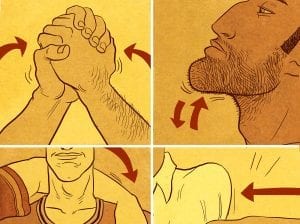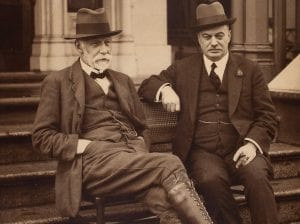The Team Trap
Our glorification of the team in workplaces and in society may be excusing us from exercising our consciences.
To read a job description, to interview, or to endure a corporate retreat is to encounter two words invoked with such reverence that you’d be forgiven for thinking they describe qualities as desirable as six-pack abs: “team player.” This dictum may not be the only valued trait in an employee, but try describing yourself otherwise and see how far beyond the handshake you get. Lately, however, the “team player” principle has presented dilemmas for Americans in and outside the workplace.
Take, for example, the scandal that rocked Penn State years ago. In the course of the investigation, e-mails came to light suggesting that former university officials knew more than they first admitted about Jerry Sandusky’s sexual abuse of children and chose to protect him and the university. While these men have been excoriated, their alleged actions can also be seen as those of solid team players: in short, a loyalty to the organization above all else.
Unthinkable? Not really. Consider the inverse.
Michael Winston was a high-level executive at Countrywide Financial, the notorious subprime mortgage company now owned by Bank of America. Winston claimed he was fired for refusing to follow unethical orders related to the 2008 financial crisis and filed a wrongful termination suit. A jury found Bank of America guilty, awarding Winston $3.8 million in damages. But he has yet to collect. Why? Bank of America appealed in two different courts, their top human resources executive testifying that Winston was fired for—wait for it—not being a team player.
The notion of the team player is not without virtue, of course. In a world that seems increasingly narcissistic—ever more unwilling to sacrifice any personal privilege for any public good—the selfless tenets behind the team philosophy can feel reassuring. Such an ideal also offers a check on a country whose core mythology is the rugged individualist. A country of rugged individualists, after all, is no country at all.
But at what point does our fetish for the team player lead us to overlook the fifty (or more) shades of grey where conscience lives? When Chief Justice John Roberts parted from his team to uphold the Affordable Care Act, it took mere hours before the “team player” cudgel was wielded against him. Conservatives exorcised their sense of betrayal by declaring Roberts a “traitor,” saying he had been “intimidated” by the left, that he was a “coward,” even that his judgment was impaired by medication for epilepsy.

At what point does our fetish for the team player lead us to overlook the fifty (or more) shades of grey where conscience lives?
Under different circumstances, and like many athletes since, Boston Bruins goalie Tim Thomas lit up sports radio for weeks when he refused to attend a Stanley Cup reception at the White House. The commentary pilloried him for putting his political principles “above the team.”
But what if those at Penn State had put their principles above the team? What if, rather than trashing Winston as a team pariah, Countrywide had listened to him? For that matter, what if traders and bankers risked the ire of corrupted business cultures by opposing them? What if the politicians whom we implore to cross aisles and solve problems were more willing to break with their teams?
No one can deny there aren’t serious consequences to those scarlet letters, “not a team player,” particularly in a culture that elevates likability over integrity. Going against one’s team often means being disliked. Which often means losing status. Just ask Roberts or Winston. But adhering to one’s team can mean much worse. Just ask Sandusky’s victims or those who have lost their life savings.
When being a team player becomes an alibi for overlooking our consciences, it’s time to, in corporate parlance, course correct. Because, these days, it seems “disloyalty” to the groups we belong to might actually be the truest act of a team player, one that our humanity—another kind of team—needs.






















